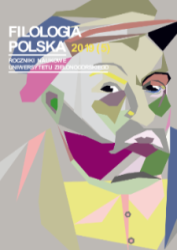Religious lexical field in memoirs from the Enlightenment on the basis of Historia mego wieku... [History of my century...] by Franciszek Karpiński
Keywords
Abstract
The analysed text of the memoir Historia mego wieku... is considered to be typical of Sentimentalism. Its author, Franciszek Karpiński, was not an ecclesiastic, so it was assumed that the religious vocabulary in this text should not diverge significantly from the common language used in this epoch. The article examined the vocabulary and phraseology that are semantically related to religion: i.a. to God, prayer, religious buildings (church, chapel, Orthodox church), members of the clergy (priest, friar, monk, pope, nun). Despite the fact that the author rarely reflects on his faith and religion, the text abounds in vocabulary related to these issues. That vocabulary presence is an evidence that writers did refer to religion in their texts on everyday life, even though they lived in the times of rationalism and atheism.
References
LITERATURA CYTOWANA
Antoniuk D., Perły klasztorów rzymskokatolickich Pokucia, „Kurier Galicyjski” 27.10.2017, za: [6331-perly-klasztorow-rzymskokatolickich-pokucia].
[Google Scholar]
Chachulski T., Franciszek Karpiński jako poeta religijny, [w:] Motywy religijne w twórczości pisarzy polskiego Oświecenia, red. T. Kostkiewiczowa, Lublin 1995.
[Google Scholar]
Cieński A., Pamiętniki, [w:] Słownik literatury polskiego oświecenia, red. T. Kostkiewiczowa, wyd. 2, Wrocław 1996.
[Google Scholar]
Gorzelana J., Swoistość stylistycznojęzykowa poezji religijnej okresu oświecenia, Zielona Góra 2016.
[Google Scholar]
Gorzelana J., Właściwości językowostylistyczne poezji religijnej Franciszka Karpińskiego, Zielona Góra 2006.
[Google Scholar]
Grzegorczykowa R., Wypowiedzi religijne jako forma uczestnictwa w sacrum, [w:] Język religijny dawniej i dziś. Materiały z konferencji. Gniezno 35 czerwca 2004, red. S. Mikołajczak i T. Węcławski, t. 2, Poznań 2005.
[Google Scholar]
Karpiński F., Historia mego wieku i ludzi, z którymi żyłem, oprac. R. Sobol, Warszawa 1987.
[Google Scholar]
Klimowicz M., Oświecenie, Warszawa 1972.
[Google Scholar]
Langkammer H., Słownik biblijny, Katowice 1982.
[Google Scholar]
Linde S.B., Słownik języka polskiego, t. 1-6, wyd. 2, Lwów 1854-1860.
[Google Scholar]
Skubalanka T., Style literatury, [w:] Słownikliteratury polskiego oświecenia, red. T. Kostkiewiczowa, wyd. 2, Wrocław 1996.
[Google Scholar]
Słownik języka polskiego, red. A. Zdanowicz (et al.), t. 1-2, wyd. M. Orgelbrand, Wilno 1861, [index.php.Słownik] języka polskiego, red. J. Karłowicz, A. Kryński, W. Niedźwiedzki, t. 6, wyd. 2, Warszawa 1952.
[Google Scholar]
Sobol R., Franciszek Karpiński, Warszawa 1979.
[Google Scholar]
Preview
Downloads
Published
How to Cite
Issue
Section
Categories
Copyright & License

This work is licensed under a Creative Commons Attribution-NonCommercial-NoDerivatives 4.0 International License.
Copyrights (a). In principle, authors who are not employed by the University of Zielona Góra retain the copyright, including publishing rights to the articles, without restrictions.
Copyrights (b). In principle, authors who are employed by the University of Zielona Góra, do not retain the copyright, including publishing rights to the articles. In such cases the copyright holder is the University of Zielona Góra.
Print ISSN
2450-3584-
Abstract116











































